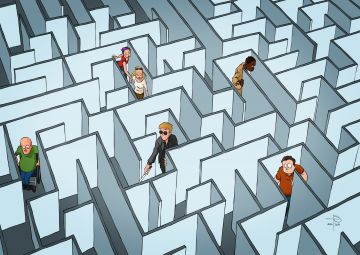The antidiscrimination laws, 10 years later: Unia highlights the major trouble spots
Unia took a critical look at the antidiscrimination and antiracism law and published a report with 27 recommendations. In brief, Unia concludes that the laws are insufficient for certain victims and do not always have enough impact. The report was written based on Unia’s experience with some 17,000 cases. The current laws have now been in place for 10 years.
Unia emphasises that for the most part, there is nothing wrong with the antidiscrimination laws. Not all countries in the EU have such an extensive legal framework as Belgium does. The Belgian legislation includes no fewer than 19 protected criteria, while the EU directives refer to just six criteria. There is also praise for the greater leeway for application of the law than prescribed by Europe. In addition, the fixed compensation of six months’ pay for discrimination on the employment market is also positive,’ Unia director Els Keytsman points out.
However, Unia is calling attention to the unsatisfactory implementation of certain provisions of the law as well as insufficient protection for certain victims.
1. Better protection for victims
Higher damages
Thus, Unia is of the opinion that there should be higher fixed damages for victims. Although significant damages are awarded for discrimination on the employment market, that is not the case for discrimination in other areas. ‘The law currently provides for fixed damages of 1,300 euros. That is barely enough to cover the legal costs. As a result, victims are not motivated to press charges,’ she explains.
Higher penalties for multiple offences
For cases of hateful motives or multiple offences, Unia is also calling for greater penalties than are currently stipulated by the Criminal Code. The antidiscrimination laws provide a list of offences for which a higher penalty can be ordered, if the offence is motivated by hate (morally repugnant motive). But since certain offences have not yet been included on this list, those perpetrators cannot currently be given an increased penalty.
‘Currently, if a gay man is blackmailed or robbed because of his sexual orientation, the perpetrator cannot be given a more severe penalty on the grounds of the crime being motivated by hate,’ Keytsman illustrates.
Broaden the concept of ‘health status’
Unia is also calling for an expansion of the criterium of health status. ‘Currently, the law refers only to a person’s present or future health. Yet we receive reports of people being fired from their jobs because they were too frequently ill in the past.’
2. Greater impact
Practical tests
In addition, there are reservations about the fact that practical tests are not explicitly mentioned in the antidiscrimination laws. Keytsman clarifies: ‘Many discrimination charges come to nothing because there is no proof, despite the potential to shift the burden of proof in a civil case. This means that the antidiscrimination law often falls short of the intended effect.’
Practical tests are a tried-and-true way of gathering evidence of discrimination, she continued. ‘Because the law does not explicitly mention them, such tests remain on shaky legal ground. Perpetrators of discrimination can currently claim that evidence against them cannot be used in court because it was unlawfully obtained (entrapment).’
Affirmative action
At the moment, affirmative action is possible only in theory. ‘The antidiscrimination law refers to affirmative action as a possible way to address discrimination, but does not specify what form this could take. If companies choose to intentionally hire people from disadvantaged groups, they are effectively discriminating. Unia wants to see this change’, added Keytsman.
Comparable articles
Unia’s survey on the acceptance of homosexuals/bisexuals: a positive evolution in mind-set even though there is still progress to be made
Upon Unia's request, iVOX conducted a survey among 1,000 people on the social perception of homosexuality/bisexuality and attitudes towards LGB (lesbians, gays and bisexuals) people. Despite an advanced legislative framework and positively evolving social acceptance, the survey revealed continuing blockages among certain groups or in sectors such as teaching and employment.
More employment discrimination cases reported to Unia in 2017
Last year Unia opened a total of 2,017 cases of situations where people felt they were the subject of discrimination. This represents a 6% increase over 2016 (1,907 cases). Instances of employment discrimination were the most frequently opened cases at Unia.
Improve the collection and processing of equality data in Belgium
"Improving equality data collection in Belgium" (IEDCB) is a Belgian project co-funded by the European Commission's Rights, Equality and Citizenship (REC) programme. It is carried out in partnership by the Equal Opportunities Team (FOD Justitie - SPF Justice) and Unia.
Unia worried about anti-Semitism in Belgium
Unia will today again press in anti-Semitism hearings in the Belgian Senate for the reintroduction of an anti-Semitism watchdog. The organisation will further ask Minister Kris Peeters, now responsible for Equal Opportunities, to take the first steps towards an inter-federal action plan against discrimination and racism.

